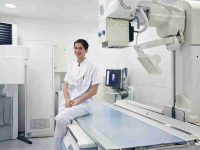
How To Become A Radiology Nurse?
As a nurse working in radiology, you’ll get to use cutting-edge equipment to help diagnose and treat patients. As there are several subspecialties within radiology, prospective radiology nurses are often advised to pursue higher education. Investigating a radiology nurse’s typical workday and salary might help you decide if this is your perfect career path.
Read on to learn what a radiology nurse is, what they do, how much they make on average, what credentials they typically need, and how to enter this field.
What is a Radiology Nurse?
A radiology nurse is a registered nurse who cares for patients undergoing diagnostic or therapeutic imaging or radiation therapy. Care is taken for patients before, during, or after an X-ray procedure.
Transporting them to the imaging center, dressing them in a hospital gown, asking them to remove any metal from their bodies, describing the procedure, and reassuring them throughout are all part of this. X-rays, ultrasounds, computed tomography (CT), and MRIs are just a few of the diagnostic modalities that a radiology nurse is familiar with.

Scan the patient’s interior organs, diagnose, and learn more about injuries using these diagnostic tools. The nurses working in the radiology department must ensure that the imaging equipment functions properly and that the patients are at ease during the examinations. They help patients go through difficult situations caused by cancer and treatment, and they work closely with medical doctors.
What Are The Specialties Of Radiology Nurses?
Here are some of the specialties listed below:
Diagnostic Radiology
Diagnostic radiology nurses assist radiologists during imaging procedures, including X-rays and MRIs. Nurses may also play a role in ensuring that patients are relaxed and at ease during procedures. Diagnostic radiology has many subspecialties that focus on specific areas of the body. Radiologists specialize in different types of imaging, including X-rays, CT scans, MRI, ultrasound, nuclear medicine, and PET scans.
In addition to providing direct patient care, an experienced nurse may also be responsible for administrative tasks, including supervising less experienced nurses, other members of the clinical staff, and students.
Interventional Radiology
Interventional radiology nurses are an important part of the radiologists, nurse practitioners, clinical nurse specialists, and physician assistants team. Radiologists require the help of nurses while executing angioplasty and stent insertions, which is a minimally invasive procedure done with imaging guidance.
Specialized tools are used to navigate through small openings in the body, inject contrast dye, and inflate balloons for diagnosing and treating medical conditions. Radiology nurses are responsible for ensuring the cleanliness of the rooms, assembling equipment and monitors, and properly positioning patients.
Oncology Radiology
Oncologic Radiology Oncology nurses have the option of specializing in radiation therapy. They aid radiation oncologists in giving cancer patients targeted treatments. Doctors may consider using three types of treatments when treating cancer patients: external beam radiotherapy, systemic radiotherapy, and internal radiotherapy.
In addition to assisting patients with the physical aspects of cancer treatment, these professionals advise patients on nutritional needs, assist with medication management, and set up follow-up meetings to assess disease progression and discuss further treatment options.
It is common for radiology nurses to work in a variety of healthcare settings, including inpatient and outpatient hospitals, imaging centers, and clinics. There is a high volume of patients and many other healthcare professionals (doctors, specialists, other nurses, and radiology technicians) on the teams that these nurses are a part of radiology.
What does a Radiology Nurse do?
A radiology nurse collaborates with other radiology providers, such as doctors, specialists, nurses, and x-ray technologists. Communication skills are especially important for radiology nurses because they often collaborate with other medical staff. A high patient turnover rate and close cooperation with other medical experts need a degree of flexibility.
- The patient’s advocate’s duties include: •acting as a conduit between the patient and the medical staff.
- Getting patients ready for surgery.
- Initiating intravenous fluids to administer contrast agents or specific dyes to patients.
- Pre-operative administration of barium enema or solution.
- Monitor a patient’s vitals or monitor their condition during procedures to detect any shifts.
- Recognizing unanticipated reactions from patients during operations.
- Administering analgesics and sedatives to patients as directed.
- Maintaining the healthcare team’s knowledge of a patient’s condition.
- Operating radiology machines and monitoring their functionality to acquire accurate findings.
- Analysis of medical pictures.
- Reassessing patients following procedures.
- Until they are released, patients must be cared for and comforted.
- Handling the process of releasing a patient.
- Attending follow-up visits.
What duties are involved in Radiology Nursing?

Radiologists’ primary duties include caring for patients who are waiting for radiological exams. One must also perform the following tasks:
- Patients are evaluated before surgery by reviewing their medical records and consulting with both the patients and their doctors.
- Educating them about their procedures and acting as a go-between for them, the nursing staff, and the doctor.
- Responding to patients’ and families’ queries and concerns about necessary procedures.
- In charge of preparing patients for procedures by providing them with the necessary instructions.
- In charge of patient pre-op care on the day of surgery.
- They inject contrast media and other specific dyes into patients.
- The individual must administer procedures that need barium enemas or solutions in charge of this duty.
- Using radiology equipment and, on occasion, interpreting diagnostic images.
- Caring for patients following procedures and checking in with them to see when they’re ready to go home.
How to Become a Radiology Nurse?

If you want to work in radiology, you might want to consider taking these courses:
Get your high school diploma:
Completing high school or its equivalent (GED) is often a college and university enrollment prerequisite. In high school, choose classes related to subjects such as Anatomical Sciences, Physiology, Biology, Chemical Sciences, and Physics. If you’re interested in a career in health care but lack relevant work experience, volunteering at a hospital or clinic is a great option.
Gain a nursing qualification:
Nursing students can choose between Bachelor of Science in Nursing (BSN) and Associate of Science in Nursing (ADN) programs at recognized universities. Although a BSN might take up to four years to finish, an ADN can be earned in two years.
A Bachelor of Science in Nursing (BSN) usually costs less than an Associate of Applied Sciences in Nursing (ADN), but the BSN includes a broader range of courses, including nursing theory, nursing practice, nursing management, and nursing administration. Employers often prefer candidates who hold a bachelor’s degrees.
Pass the NCLEX-RN:
To become a registered nurse in the United States, one must first receive a nursing degree and then take and pass the National Council Licensure Examination for Registered Nurses (NCLEX-RN). The NCSBN administers this exam. Passing this exam permits you to acquire your license to practice as a registered nurse. You must meet certain requirements to be eligible to take this test. So investigate these requirements before registering.
Participate in clinical training:
Radiologists are in high demand; some hospitals may hire and/or retrain new radiologists. It’s not uncommon for radiology departments to seek applicants with at least a year of experience as registered nurses. Many advanced facilities want to hire radiology nurses who have earned a master’s degree or higher.
Obtain a postgraduate degree in radiology:
You can become a radiologic technologist by obtaining an MSN or DNP degree. A radiologist nurse can specialize in adult care, family radiology, or clinical nursing with a master’s or doctoral degree in nurse. Radiologists who complete these programs can fulfill their educational requirements for certification by performing radiographic examinations or in a specific specialty-related post-certificate master’s degree. In the case of radiology, an MSN, APRN licensure, and specialty certification are all highly sought after by prospective employers.
Work as a radiology nurse for some time:
Work experience as a radiology nurse can be gained at various radiology facilities. Facilities like those for diagnostic imaging and outpatient surgery are also options. Aside from hospitals, you may also visit urgent care centers or outpatient clinics. To become certified, nurses working in radiology must have at least two years of experience.
Gain your Radiology certification:
Suppose you’re a nurse interested in working in radiology. In that case, you can get your CRN by passing the Certified Radiology Nurse exam. For an applicant to be considered, a minimum of 2,000 clock hours must have been worked in the nursing profession during the last three years.
They’ve also completed at least 30 contact hours of radiology-related CEUs during the past two years, 15 specifically dedicated to radiology nursing. Contact hours for nurses can be earned through participation in activities sanctioned by an ANCC-accredited agency.
In May and October each year, the ARIN Center for Nursing Education and Testing administers the ARIN Certification Exam in Radiologic Nursing for Imaging (C-NET). Radiologic technologists must retake and pass the CRN exam every four years and meet all other certification requirements.
What kind of environment does a Radiology Nurse typically practice in?
The following are the organizations that hire radiology nursing staff the most frequently:
- Hospitals
- Imaging centers for diagnosis
- Community health clinics
Necessary Skills
Radiology nurses typically use technical and interpersonal abilities to achieve their goals. Their most valuable abilities include the following:
Communication:
Nurses with expertise in radiation radiology may collaborate with other healthcare professionals to provide seamless communication between patients, their loved ones, and the care team. Communication can help families and medical staff members notify each other when patients’ conditions change.
Interpersonal:
The capacity to empathize with patients and provide soothing words or touches is a crucial skill for nurses in this field.
Multitasking:
Nurses specializing in radiology may be responsible for various responsibilities within and outside imaging centers to guarantee the quality of diagnostic images and the care they provide to patients.
Acquiring scientific and technical expertise:
These registered nurses are experts in human anatomy, radiology, and the use of diagnostic equipment.
Teamwork:
Nurses who are experts in radiology may often cooperate with other medical experts. Getting along with different personalities and adapting to their communication styles can help them grow.
What additional qualifications do radiological nurses need?
If you want to be hired as a radiologist, there are a few additional requirements for some companies.
Orientation
A radiology orientation or preceptorship is a common requirement for entry-level nursing positions. Orientation courses may take up to 12 weeks to complete.
Training that lasts
Continuing education classes assist nurses in staying updated on nursing practice standards and evidence-based solutions. The annual credit or hour requirements differ for each company and each state’s regulatory body. However, Certified Nursing Assistants (CNAs) must complete 60 continuing education hours every four years to maintain their certification.
What is the Salary and job outlook for radiology nurses?
Nursing professionals that specialize in radiology care are in high demand. Employment is anticipated to expand by 6% between 2021 and 2031. The Bureau of Labor Statistics reported that all registered nurses’ average pay is $82,750.
Radiology nurse positions at Incredible Health range in salary from $46,000 to $140,000. Payment varies greatly between urban centers. Radiology nurses consistently report being highly satisfied with their occupations due to job security, competitive pay, and a rapidly growing industry.
Radiology nurses typically have an 8-12 hour shift, Monday through Friday, allowing them to maintain a healthy balance of work and personal life with no weekends or holidays. Many of them appreciate the opportunity for individual initiative and camaraderie from working on a smaller team. Nurses who work in radiology often remain in the field for decades. Furthermore, there is the opportunity to develop professionally.
Conclusion
Becoming a radiology nurse is a rewarding and challenging career choice. It requires specialized knowledge in human anatomy, radiology, and the use of diagnostic equipment, as well as interpersonal skills to empathize with patients. Radiology nurses must also complete an orientation or preceptorship program and continuing education classes to stay up-to-date on nursing practice standards. The job outlook for radiology nurses is positive, with competitive salaries and opportunities for professional growth. Radiology nurses can maintain a healthy balance between work and personal life with no weekends or holidays.







